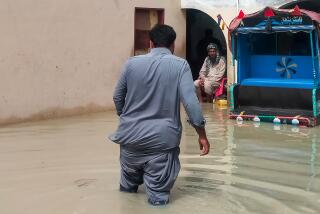Pakistan’s capital is put on high alert
Police stepped up security and put this capital on high alert Tuesday after apparent twin suicide bombings in a nearby army garrison city killed 25 people and injured more than 60.
The double blasts struck at the heart of Pakistan’s military establishment in Rawalpindi, which adjoins Islamabad and is home to President Pervez Musharraf and other senior government figures.
Although there was no claim of responsibility, officials suspect that the morning bombings were linked to the volatile situation in the region along Pakistan’s border with Afghanistan, where government forces have been battling Islamic militants with ties to Al Qaeda and the Taliban.
The explosions also heightened the political tension gripping Pakistan as Musharraf, whom the White House regards as a key ally in its battle against terrorism, fights to keep his job amid a sharp drop in popularity.
The military -- the power base for Musharraf, who is the country’s top general as well as its president -- also has been hit by setbacks and embarrassments. On Thursday, for instance, as many as 200 soldiers were taken captive by suspected militants in the border region of South Waziristan.
Striking Rawalpindi “shows that the militants have grown stronger and bolder, and that’s the message they want to convey,” said Talat Masood, an analyst and retired lieutenant general. “What is happening in tribal areas where they have abducted more than 100 soldiers proves that they have become stronger.”
The first explosion occurred about 7 a.m., during the morning rush hour, on a bus traveling near the military headquarters and only a few miles from Musharraf’s residence and office. Television video showed the bus reduced to little more than a charred frame hung with bits of flesh and clothing.
Officials speaking on condition of anonymity said the bus was full of civilian and military employees of the Inter-Services Intelligence agency, the army’s powerful intelligence outfit. But publicly, authorities said only that the passengers worked for the Defense Ministry.
Interior Ministry spokesman Javed Iqbal Cheema described the attack as a suicide bombing, but the police officer in charge of the area said the bomb might have been planted on the bus.
About 15 minutes after the first blast, a second ripped through a nearby market area, caused by a suicide bomber who rammed his motorcycle into nearby vehicles, authorities said.
Musharraf condemned the attacks, which came as his aides reportedly were meeting with exiled former Prime Minister Benazir Bhutto in Dubai, United Arab Emirates, to try to seal an agreement that would help shore up Musharraf’s faltering presidency. Musharraf has held the job since mounting a military-backed coup eight years ago.
Both sides have put out conflicting signals as to the progress of the talks. Under discussion is an arrangement that probably would result in Bhutto’s Pakistan People’s Party throwing its support behind Musharraf in exchange for a pledge from him to step down as army chief, corruption charges against Bhutto being dropped and her contesting parliamentary elections late this year.
Negotiations have been underway for months. Complicating matters now is the expected return to Pakistan next week of another rival, former Prime Minister Nawaz Sharif, whom Musharraf ousted from power. In exile since the coup, Sharif set his return for Monday after Pakistan’s Supreme Court ruled that he was entitled to come back.
Bhutto has said she will announce a date next week for her own return to Pakistan, even if a deal with Musharraf has not been reached.
--
Special correspondent Zaidi reported from Islamabad and Times staff writer Chu from New Delhi.
More to Read
Start your day right
Sign up for Essential California for news, features and recommendations from the L.A. Times and beyond in your inbox six days a week.
You may occasionally receive promotional content from the Los Angeles Times.







